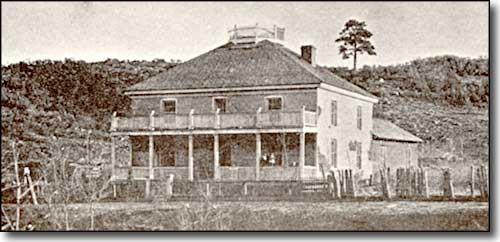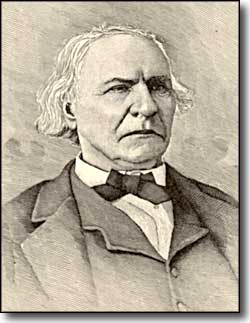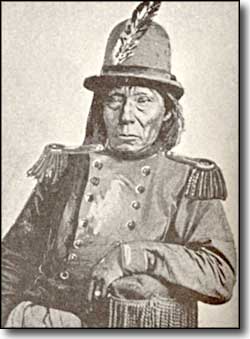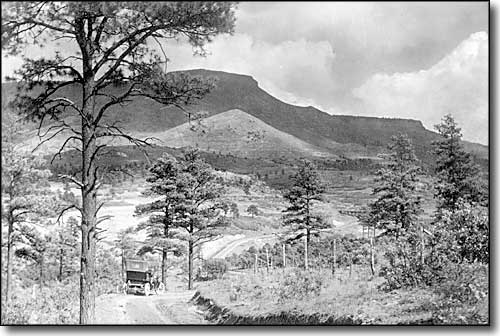 |
Richens Lacy "Uncle Dick" Wootton |
|
|
 Uncle Dick's home in Raton Pass |

Richens Lacy Wootton was born May 6, 1816, in Mecklenberg County, Virginia. When he was 7, the family moved to Christian County, Kentucky, where Richens lived until he was 17. Then he went to an uncle's cotton plantation in Mississippi for almost 2 years. At that point, he headed west to Independence, Missouri. That was 1836. He took a job with a wagon train run by Bent, St. Vrain & Co., headed for Bent's Fort in Colorado. That began a long adventure with Dick Wootton becoming known as a mountain man and one of the best frontiersman/trapper/guides in the West. He fought with, and traded with, many of the different Indian tribes. He traveled over almost the entire western half of the country as a trapper and later as a military guide. By 1840, trapping had become far less profitable. Wootton took a job at Bent's Fort as a hunter. The primary game was buffalo and he hunted them only for food. Over the years, though, the "skin hunters" hunted the buffalo almost to extinction, hunting them only to feed an Eastern market that was hot for buffalo skin robes. Wootton tried an experiment with buffalo farming in the vicinity of where Pueblo is now. He raised buffalo and cattle together for three years, then drove his herd east along the Santa Fe Trail to Kansas City. There he sold them all for a good profit to a man who then took them to New York. |

Over the years Dick did whatever was necessary to feed his growing family. In 1859 he signed the incorporation papers for the city of Denver (one story says he signed as chief tavernmaster). In 1866 he came to Trinidad with permission from the territorial governments of Colorado and New Mexico (and a lease from Lucien Maxwell, owner of the Maxwell Land Grant) to build a toll road over Raton Pass. As most folks thought the work was too hard, Dick hired a tribe of Utes under Chief Conniache to help him. He improved some 27 miles of the toughest part of the road. "There were hillsides to cut down, rocks to blast and remove," he said, "and bridges to build by the score. But I built the road and made it a good one." (That's Chief Conniache on the right, in his favorite military uniform) He erected a tollgate in front of his house and charged $1.50 for 1 wagon or buggy and 25 cents for a horseman, prices that he changed from time to time. But he always allowed the Indians to use the road free of charge. His home near the toll road was always open to stagecoach passengers who found a hot lunch and an abundance of good stories waiting at his table. The Atchison, Topeka and Santa Fe Railroad bought the right of way from Wootton in 1879 and built the railroad all the way to Santa Fe in 1880, ending the era of the Santa Fe Trail. At first the railroad offered him $50,000 for the road but he turned that down. Instead he sold it to them for $1, a monthly stipend and grocery money for his wife for the rest of her life. The timing was good for Uncle Dick because he was going blind, a condition that afflicted him for several years until a newly arrived doctor tried an experimental surgery on him and it worked, sort of. Where before he could hit a target dead center every time with a rifle, now he could at least hit the barn behind it. But he did pass the last few years of his life in relative ease and comfort in his house high on Raton Pass. He died in 1893, having outlived all of his 5 wives and 17 of his 20 children. 1893 is the same year the US Census Bureau declared an end to the "American Frontier." Recommended reading: "Uncle Dick" Wootton by Howard L. Conard, first published in 1890. Time/Life Books republished it in their "Classics of the Old West" series in 1980. |
 Raton Pass in the early 1900's |
|
|
| Our History & Heritage - Raton Pass |
 |
| Index - Arizona - Colorado - Idaho - Montana - Nevada - New Mexico - Utah - Wyoming National Forests - National Parks - Scenic Byways - Ski & Snowboard Areas - BLM Sites Wilderness Areas - National Wildlife Refuges - National Trails - Rural Life Sponsor Sangres.com - About Sangres.com - Privacy Policy - Accessibility |
| Photo of Raton Pass courtesy of the Aultmann Collection (Colorado Historical Society). All other photos courtesy of Time/Life Books: “Uncle Dick” Wootton. Text Copyright © by Sangres.com. All rights reserved. |